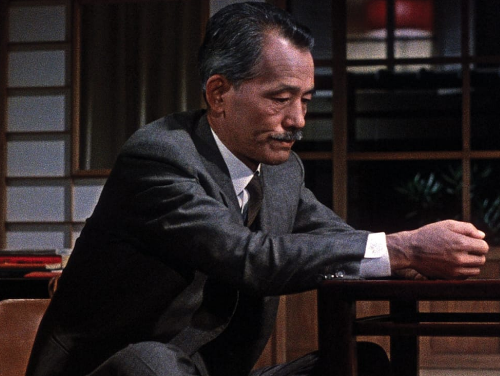
The last film by Yasujiro Ozu was also his final masterpiece, a gently heartbreaking story about a man’s dignifed resignation to life’s shifting currents and society’s modernization. Though the widower Shuhei has been living comfortably for years with his grown daughter, a series of events leads him to accept and encourage her marriage and departure from their home.
"Ozu’s last film and one of his most sublime, An Autumn Afternoon was undoubtedly influenced by the death, during filming, of his mother, with whom he had lived all his life. The film is suffused with an autumnal sense, evocative of the end of things, that is countered by its gently satirical portrait of contemporary Japan. An Autumn Afternoon returns to a perennial Ozu theme: a widower's decision to marry off his only daughter, despite her objections. Having done the right thing, the old man becomes painfully aware of his isolation and loss, and in the fashion of other disaffected elders within the Ozu universe, finds a measure of solace in drunken comradeship.”
Harvard Film Archive1
“With an intense tenderness for his characters and an exquisite sensitivity to their slightest emotional tremors, Ozu is one of the most humane of filmmakers. It’s strange to think of Ozu as a political artist – indeed, I generally think of him as an unusually impulsive and spontaneous filmmaker, who plays freely with cinematic grammar in choosing and composing shots that respond to his feelings about events. [...] He is fundamentally concerned with the question of tradition versus modernity, and examines the conventional decorum and formal behavior that in Japan hinder emotional self-expression and inhibit sincere action and plain thought.”
Richard Brody2
“What Ozu left us is not a style of film-making. That style is so unmistakable that anyone who dared imitate it would risk exile to a faculty position at an obscure institution for film education. He left something a good deal more important, an appreciation of the possibilities of all films. [...] Although Ozu’s films are realistic – they’re usually about relationships within upper middle-class families – they evoke emotions not only through identification but also through methods more commonly associated with music and other nonrepresentational forms of art, through rhythms and patterns that express the essence of things.”
The New York Times3
“Ozu makes us feel deeply about his characters, but he does so by being honest rather than manipulating us. Hence his famous restraint: like the stories themselves, the performances avoid histrionics and melodrama. If we are enormously moved at the end of his films, it is not because anyone has pushed the right buttons but because we have seen something that strikes us as truthful.”
Geoff Andrew4
- 1Harvard Film Archive.
- 2Richard Brody, “DVD of the Week: An Autumn Afternoon,” The New York Times.
- 3The New York Times, “Screen: A Profound Japanese Film: An Autumn Afternoon Was Ozu’s Last Work,” The New York Times, 8 May 1973.
- 4Geoff Andrew, “An Autumn Afternoon: a fond farewell Exquisitely moving and truthful, An Autumn Afternoon is a fitting end to the great career of Yasujirô Ozu,” BFI, 16 May 2014.

